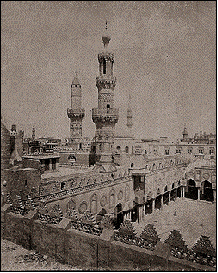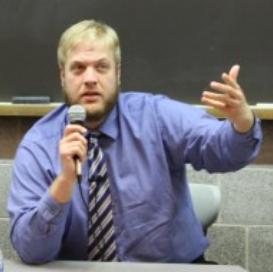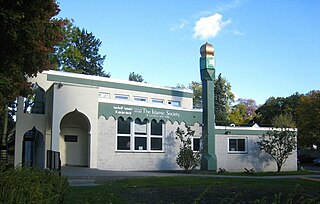Related Research Articles

Islam is the third-largest religion in the United States (1.34%), behind Christianity (67%) and Judaism (2.4%). The Association of Statisticians of American Religious Bodies in its 2020 US Religion census estimated that 1.34% of the population of the United States are Muslim. In 2017, twenty states, mostly in the South and Midwest, reported Islam to be the largest non-Christian religion.

The Muslim Students Association, or Muslim Student Union, of the U.S. and Canada, also known as MSA National, is a religious organization dedicated to establishing and maintaining Islamic societies on college campuses in Canada and the United States. It serves to provide coordination, community, outreach and support for affiliated MSA chapters in colleges across North America. Established in 1963, the organization now has chapters in colleges across the continent, and is the precursor of the Islamic Society of North America and several other Islamic organizations. The Muslim Students Association has at times been the subject of scrutiny; for example, the New York Police Department (NYPD) targeted MSAs across several US college campuses for monitoring as part of their Muslim surveillance program.

Islam is a minority faith in Thailand, with statistics in 2006, suggesting 4.9% of the population are Muslim. Figures as high as 5% of Thailand's population have also been mentioned. A 2023 Pew Research Center survey gave 7%. Thai Muslims are the largest religious minority in the country. As of 2024, there are approximately 7.5 million Thai Muslims in the Kingdom or about 12% of the total 62.5 million Thai populations..

Islam is the dominant religion in Egypt, with approximately 90% of Egyptians identifying as Muslims. The majority of Egyptian Muslims are adherents of Sunni Islam, while a small minority adhere to Shia Islam. Since 1980, Islam has served as Egypt's state religion. Due to the lack of a religious census, owing to the alleged undercounting of non-Muslim minorities in Egyptian censuses, the actual percentage of Muslims is unknown; the percentage of Egyptian Christians, who are the second-largest religious group in the country, is estimated to be between 6% and 11% of the population.

Islam constitutes the third largest religion in Singapore, with Muslims accounting for approximately 15.6% of the population, as indicated by the 2020 census. Predominantly, Singaporean Muslims are Sunni Muslims adhering to either the Shafi‘i or Hanafi schools of thought. The majority of the Muslim population, about 80%, are ethnic Malays, while 13% are of Indian descent. The remaining fraction comprises local Chinese, Eurasian, and Arab communities, in addition to foreign migrants. Buddhism and Christianity are the two larger religious affiliations in the country.

The Islamic Society of North America (ISNA) is a non-profit Muslim religious organization based in the United States and serving North America. It provides a number of programs and services to North America's Muslim communities and broader societies. ISNA holds an annual convention that is generally regarded as the largest regulated gathering of Muslims in the United States. It is headquartered in Plainfield, Indiana. The organization has been subject to various controversies throughout its existence.
Yusuf Bey was an American Black Muslim activist and leader who was a member of the Lost-Found Nation of Islam, an offshoot of Louis Farrakhan's Nation of Islam (NOI).

Chile is a predominantly Christian country, with adherents of Islam being a minuscule minority. Due to the secular nature of Chile's constitution, Muslims are free to proselytize and build places of worship in the country. The statistics for Islam in Chile estimate a total Muslim population of approximately 5,000, representing less than 0.02% of the population. There are a number of Islamic organizations in Chile, including the Muslim Society of Chile and As-Salam Mosque in Santiago, Bilal Mosque in Iquique, the Mohammed VI Cultural Center in Coquimbo, and Islamic Foundation of Chile in Santiago.

Islam is the second largest religion in Norway after Christianity. As of 2020, the number of Muslims living in Norway was 182,607. The majority of Muslims in Norway are Sunni, with a significant Shia minority. 55 percent of Muslims in the country live in Oslo and Viken. The vast majority of Muslims have an immigrant background, and very few Norwegians are Muslim.

Suhaib Webb is an American Muslim imam who converted from Christianity to Islam in 1992. He has previously been the imam of the Islamic Society of Boston Cultural Center (ISBCC).

Angola is a predominantly Christian country with Islam being a minority religion. As of 2014 census, there are 195,000 Muslims in Angola, representing 1% of total population. Most Muslims in Angola are Sunni. They are generally foreign migrants from West Africa and the Middle East, although a few are local converts. There exist several Islamic organizations that run mosques, schools and community centers. The Association of the Development of Islam in Angola is the primary proselytizing organization. Muslim Angolans are represented by the Supreme Council of Angolan Muslims of Luanda. As of 2020, the Angolan government does not legally recognize any Muslim organizations; as a result, mosques in the country have faced restrictions and many have been shut down by the government.

The Islamic Society of Central New York is a "purpose-built" Sunni mosque and Islamic community centre located on Comstock Avenue in Syracuse, NY. Founded in 1981, by Khaja Qutubuddin, the center serves the needs of Central New York's estimated 15,000 - 20,000 Muslims providing various services and outreach programs for the Muslim and non-Muslim community. It also runs an Islamic cemetery and the Madrasat Al Ihsan/School of Excellence on West Onondaga Street. The mosque is served by a full-time Imam and is administered by an elected Shura Council.

The Cheraman Juma Mosque is a popular prayer centre in Kodungallur in Thrissur district. According to hagiographical legends, it is claimed that the mosque was built in 629 CE by Malik Bin Dinar.

Dar Al-Hijrah Islamic Center is a mosque in Northern Virginia. It is located in the Seven Corners area of unincorporated Fairfax County, Virginia, in the Washington, D.C., metropolitan area.
The Constitution of Bahrain states that Islam is the official religion and that Shari'a is a principal source for legislation. Article 22 of the Constitution provides for freedom of conscience, the inviolability of worship, and the freedom to perform religious rites and hold religious parades and meetings, in accordance with the customs observed in the country; however, the Government has placed some limitations on the exercise of this right.

Feisal Abdul Rauf is a Kuwaiti-born Egyptian-American Sufi imam, author, and activist whose stated goal is to improve relations between the Muslim world and the West. From 1983 to 2009, he served as Imam of Masjid al-Farah, a mosque in New York City. He has written three books on Islam and its place in contemporary Western society, including What's Right with Islam Is What's Right with America, and founded two non-profit organizations whose stated missions are to enhance the discourse on Islam in society.
Talat Hamdani is a Pakistan-born American who became a commentator after her son was killed during Al Qaeda's attacks on September 11, 2001. Her eldest son, Mohammad Salman Hamdani, was a New York Police Department cadet, who had trained as a first responder.

Mohamed Zuhdi Jasser is an American religious and political commentator and physician specializing in internal medicine and nuclear cardiology in Phoenix, Arizona. Jasser is a former lieutenant commander in the United States Navy, where he served as staff internist in the Office of the Attending Physician of the United States Congress. In 2003, with a group of American Muslims, Jasser founded the American Islamic Forum for Democracy (AIFD) based in Phoenix, Arizona, and in 2004 he was one of the founders of the Center for Islamic Pluralism.

The Islamic Society of Greater Houston (ISGH) is a system of mosques in Greater Houston. It is headquartered at the Eastside Main Center in Upper Kirby in Houston.

As of 2012, the city of Houston has the largest Muslim population in Texas and the largest Muslim population in the Southern United States. That year, Kate Shellnut of the Houston Chronicle wrote that "Some estimate that Muslims make up 1.2 percent of the city's population." As of 2012 the estimated population of Muslims in Houston was around 63,000. As of today, there are over 209 mosques and storefront religious centers, with the largest being the Al-Noor Mosque of the Al Noor Society of Greater Houston.
References
- ↑ "Scrutiny Increases for a Group Advocating for Muslims in US". The New York Times . March 14, 2007. Retrieved 2010-02-25.
- ↑ "Interfaith Gathering in SF". San Francisco Chronicle . May 25, 2004. Retrieved 2010-02-25.
- ↑ "Reflecting on Ramadan - Group Raises Awareness of Muslim Observance". San Francisco Chronicle . December 6, 1999. Retrieved 2010-02-25.
- ↑ "Middle East History 101". The Commonwealth Club. May 4, 2003. Retrieved 2010-02-25.
- ↑ Waldman, Peter. "At a U.S. Mosque, Path of Tolerance Leads to Tumult". The Wall Street Journal. Retrieved June 22, 2015.